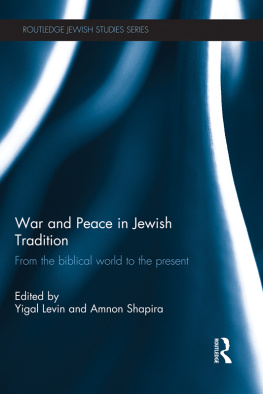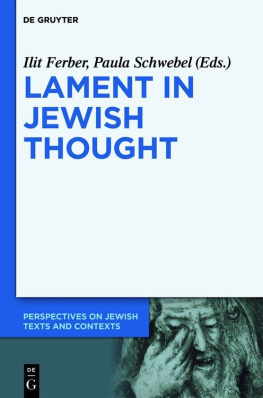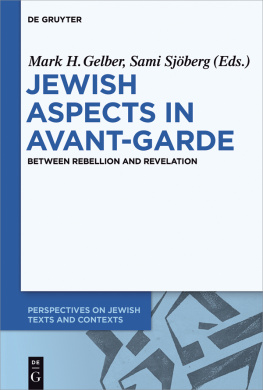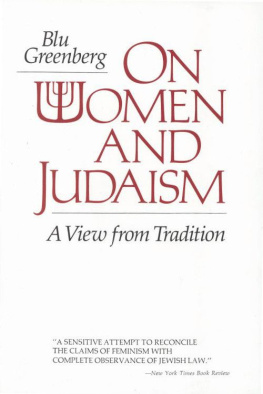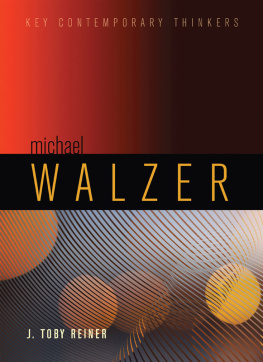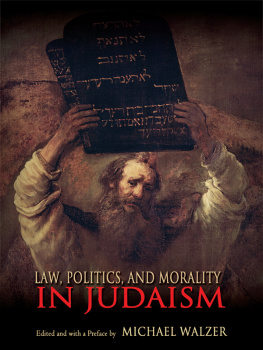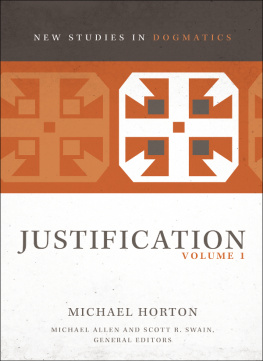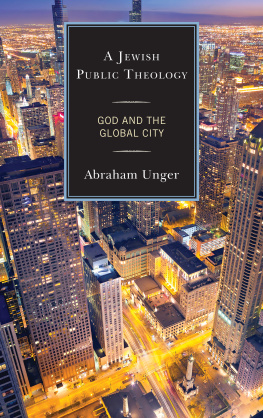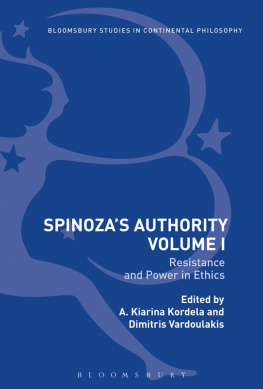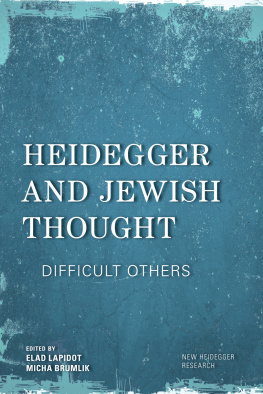Michael Walzer - Jewish Political Tradition, Volume I: Authority
Here you can read online Michael Walzer - Jewish Political Tradition, Volume I: Authority full text of the book (entire story) in english for free. Download pdf and epub, get meaning, cover and reviews about this ebook. year: 2003, publisher: Yale University Press, genre: Science / Politics. Description of the work, (preface) as well as reviews are available. Best literature library LitArk.com created for fans of good reading and offers a wide selection of genres:
Romance novel
Science fiction
Adventure
Detective
Science
History
Home and family
Prose
Art
Politics
Computer
Non-fiction
Religion
Business
Children
Humor
Choose a favorite category and find really read worthwhile books. Enjoy immersion in the world of imagination, feel the emotions of the characters or learn something new for yourself, make an fascinating discovery.

- Book:Jewish Political Tradition, Volume I: Authority
- Author:
- Publisher:Yale University Press
- Genre:
- Year:2003
- Rating:3 / 5
- Favourites:Add to favourites
- Your mark:
- 60
- 1
- 2
- 3
- 4
- 5
Jewish Political Tradition, Volume I: Authority: summary, description and annotation
We offer to read an annotation, description, summary or preface (depends on what the author of the book "Jewish Political Tradition, Volume I: Authority" wrote himself). If you haven't found the necessary information about the book — write in the comments, we will try to find it.
Jewish Political Tradition, Volume I: Authority — read online for free the complete book (whole text) full work
Below is the text of the book, divided by pages. System saving the place of the last page read, allows you to conveniently read the book "Jewish Political Tradition, Volume I: Authority" online for free, without having to search again every time where you left off. Put a bookmark, and you can go to the page where you finished reading at any time.
Font size:
Interval:
Bookmark:
The Jewish Political Tradition
EDITORS Michael Walzer
Menachem Lorberbaum
Noam J. Zohar
VOLUME I Authority
EDITORS
Michael Walzer
Menachem Lorberbaum
Noam J. Zohar
COEDITOR
Yair Lorberbaum

Published with assistance from the Castle Fund, endowed by John K. Castle to honor his ancestor the Reverend James Pierpont, one of Yales original founders, and administered by the Program in Ethics, Politics, and Economics at Yale University.
Copyright 2000 by Yale University.
All rights reserved. This book may not be reproduced, in whole or in part, including illustrations, in any form (beyond that copying permitted by Sections 107 and 108 of the U.S. Copyright Law and except by reviewers for the public press), without written permission from the publishers.
Designed by Sonia L. Shannon. Set in Bembo type by Tseng Information Systems, Inc., Durham, North Carolina. Printed in the United States of America by Edwards Brothers, Ann Arbor, Michigan.
The Library of Congress has cataloged the hardcover edition as follows:
The Jewish political tradition / editors, Michael Walzer, Menachem Lorberbaum, Noam J. Zohar.
p. cm.
Includes bibliographical references and indexes.
Contents: v. 1. Authority.
ISBN 0-300-07822-6 (alk. paper)
1. JewsPolitics and government. 2. Judaism and politics. 3. Judaism and state. 4. LeadershipReligious aspectsJudaism. I. Walzer, Michael. II. Lorberbaum, Menachem, 1958. III. Zohar, Noam.
DS140 .J475 2000
320.088296dc21 99-059743
A catalogue record for this book is available from the British Library.
The paper in this book meets the guidelines for permanence and durability of the Committee on Production Guidelines for Book Longevity of the Council on Library Resources.
ISBN 0-300-10201-1 (pbk. : alk. paper)
10 9 8 7 6 5 4 3 2
... we see it as in a dream.Psalm 126:1
To the halutzimthe pioneerswho paved the roads connecting dream and reality
DAVID HARTMAN
MICHAEL WALZER
MENACHEM LORBERBAUM AND NOAM J. ZOHAR
MICHAEL FISHBANE
. Covenant: Gods Law and the Peoples Consent
. Revelation: Torah and Reason
. Kings
. Priests
. Prophets
. Rabbis and Sages
. Controversy and Dissent
. The Good Men of the Town
. The Gentile State
. The State of Israel
Chapter 11. Election
Chapter 12. Social Hierarchy
Chapter 13. Gender Hierarchy
Chapter 14. Converts
Chapter 15. Heretics and Apostates
Chapter 16. Gentiles
Chapter 17. The Communal Bond
Chapter 18. Husband and Wife
Chapter 19. Family
Chapter 20. Welfare
Chapter 21. Taxation
Chapter 22. Communal Government
Chapter 23. Enforcement and Coercion
Chapter 24. The Courts
Chapter 25. Land
Chapter 26. War
Chapter 27. Exile
Chapter 28. Politics Without Sovereignty
Chapter 29. Redemption
Chapter 30. The Value of Political Life
The quest for spiritual meaning is often identified with a leap of the alone to the Alone, with the religious experience of lonely men and women of faith. The biblical roots of the Jewish tradition, however, point toward a different conception, in which the central focus of spiritual life is on community. The covenant with God is mediated through a collective drama, the story of a nation deprived of freedom and dignity for generations, delivered from its bondage, and brought into a covenant with God. Only by participating in the collective liberation from Egypt can the individual grasp the meaning of a life rooted in the revelation at Sinai.
History and collective memory are definitive categories in the biblical tradition. The covenant is enacted day after day through the ethical, ritual, and political forms of community.
Israels loss of sovereignty and its exile from the land did not mean the end of this community. Rabbinic Judaism developed a comprehensive way of life mediated by explicit and precise legal norms that sustained the collective thrust of Judaic spirituality. Prayers were formulated in the plural; important segments of religious worship were conditioned upon a quorum of ten; the celebration of the Shabbat and the festivals was simultaneously familial and communal. The kahal provided both a site and a structure for the common life.
In response to this strong collective orientation, many modern Jewish religious thinkers sought to rescue and reinstate the individual by infusing Judaic spirituality with an existentialist passion. Their aim was to shift the focus of the Jews religious imagination from Mosesthe prophet as political and legislative leaderto Abraham and the patriarchs, that is, to religious figures who could mediate the intensity of the individuals experience before God.
But with the establishment of the state of Israelthe third Jewish commonwealthJewish thinkers have to address again the central issues of collective existence. Their challenge is to formulate a spiritual vision suited to the new social realities of sovereignty in the world. The complexity of the ethical and political issues that surface within the emerging Israeli democracy require a language rooted in the historical experience of the Jewish people but capable also of shaping the common life of a modern state.
Because of national renewal and empowerment, Jews are no longer living metaphors for the other, the stranger, the eternal victim. They now wield power in a sovereign state, and so they cannot conceal their moral failures by blaming others. The rebirth of Israel provides the Jewish people with a public arena where they themselves must take charge, drawing on the strength of their tradition to give a direction to political life and a content to popular aspiration. Now Jewish values must come to grips with Jewish power.
Judaism isnt confined to the privacy of the synagogue, the family, or the academy of learning. It is now being tested in the public square and the political assembly, where the hard questions that face self-governing nations cannot be ignored. There is no escaping to the privacy of the inner soul or to some spiritual sanctuary separated from the mundane issues of everyday life: poverty, social welfare, unemployment, relations with strangers, tolerance, pluralism, security, and justice. Given the compromises that a full political life requires, how can Jews retain a compelling moral vision?
If public life in Israel cannot derive moral strength and critical insight from the tradition; if the private and public domains, the worlds of the individual and the citizen, are totally isolated from one another, then the Jewish people will lose their sense of history and identity. If the language of politics is void of personal meaning, and the language of private life void of political idealism, we will forfeit a historic opportunity to build a society that overcomes the modern tendency to separate self-realization and communal commitment.
These volumes on the Jewish political tradition fill a pressing need: they aim to retrieve a Jewish political discourse concerned with issues like authority, distributive justice, membership, and welfare. They help correct the mistaken notion that the Jewish tradition was concerned only with ritual celebration, laws of purity, daily worship, the study of Torah. They make the political arguments that have gone on for more than three millennia accessible, so that readers can gain a new appreciation of the traditional meaning of covenantal engagementwhich encompassed not only the life of worship but also the building of a just and compassionate community.
Next pageFont size:
Interval:
Bookmark:
Similar books «Jewish Political Tradition, Volume I: Authority»
Look at similar books to Jewish Political Tradition, Volume I: Authority. We have selected literature similar in name and meaning in the hope of providing readers with more options to find new, interesting, not yet read works.
Discussion, reviews of the book Jewish Political Tradition, Volume I: Authority and just readers' own opinions. Leave your comments, write what you think about the work, its meaning or the main characters. Specify what exactly you liked and what you didn't like, and why you think so.



